Select Language

BANGKOK (Reuters) - Thailand's economy is in a critical situation, the prime minister's chief of staff said on Monday, stressing a need for measures to tackle household debt, boost tourism and inject stimulus into the economy.
"Figures show we are not in good shape," Prommin Lertsuridej told reporters.
His remarks come as Prime Minister Srettha Thavisin's government pushes to revive Southeast Asia's second-biggest economy, which has suffered from weak exports and a slow recovery from the pandemic compared to regional peers.
The economy unexpectedly contracted in the fourth quarter of 2023 and policymakers have downgraded the growth outlook for this year, adding to pressure on the central bank to give in to the prime minister's near-daily demands for an interest rate cut.
"We are doing everything we can," Prominn said, referring to stimulus measures including visa-free tourism and policies to address household debt that is at a rate of 91% of gross domestic product.
He added the government's annual budget should be approved and ready to spend by next month.
The budget has been on hold since October due to a delay last year in forming a government.

By Liz Lee and Albee Zhang
BEIJING (Reuters) - China's Premier Li Qiang will not hold a press conference after the close of this year's annual parliamentary meeting, an official said on Monday, ending a tradition maintained for three decades.
Since 1993, China's premiers have met the media after the annual gathering of the National People's Congress (NPC), offering journalists, including the foreign press, a rare chance to ask questions in a typically wide-ranging news conference.
The decision was made because there would be more briefings by government ministers during the annual parliament meeting where senior cabinet officials will talk about issues on diplomacy, economy and people's livelihood, NPC spokesman Lou Qinjian told reporters on Monday.
The premier would not give media briefing at the conclusion of future NPCs, Lou added.
At the close of the annual parliament last year, Li sought to reassure the country's private sector in his first media conference as premier.

(Reuters) - NASA said on Friday it is shutting down a more than $2 billion project to test satellite servicing like fueling in space, citing higher costs and schedule delays.
The space agency said in October that the On-orbit Servicing, Assembly, and Manufacturing 1 (OSAM-1) project continues to face an increase in costs and is expected to exceed its $2.05 billion price tag and the December 2026 launch date.
For its decision to discontinue the project, NASA on Friday cited "continued technical, cost, and schedule challenges, and a broader community evolution away from refueling unprepared spacecraft, which has led to a lack of a committed partner".
Much of the project's cost growth and scheduling delays could be attributed to the "poor" performance of contractor Maxar, NASA said in October.
Maxar was previously contracted by NASA in 2019 to help build its Gateway platform in lunar orbit, a crucial outpost for America's first mission to relay astronauts to the moon.
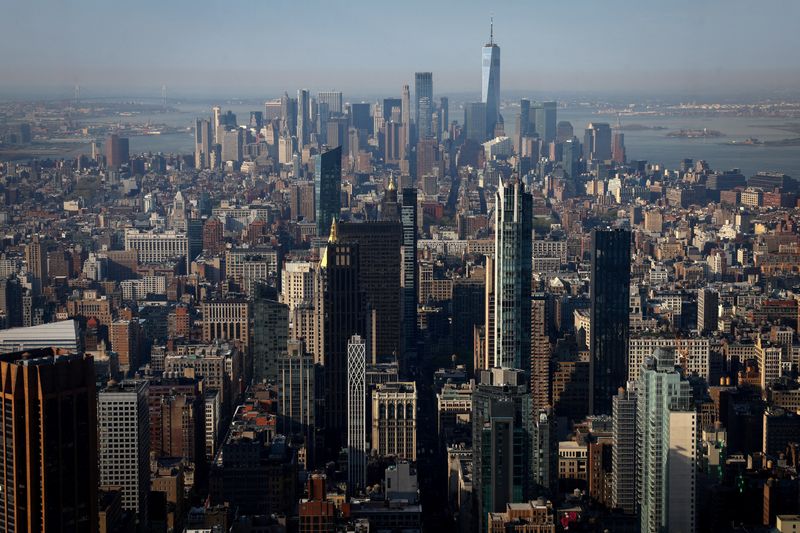
(Reuters) -Credit ratings agency Fitch on Friday affirmed United States' long-term foreign currency sovereign credit rating at "AA+" with a "stable" outlook.
Fitch forecast the country's gross domestic product growth to slow in 2024, despite its economy proving resilient in the face of higher interest rates.
The U.S. economy grew by 2.5% in 2023, partly reflecting the renewed fiscal policy easing as highlighted by the large general government (GG) deficit in 2023.
Fitch estimated that the GG deficit had reached 8.8% of GDP in 2023 and forecast the 2024 GG deficit to narrow to 8% of GDP, on the back of escalating revenue growth, narrower spending, falling off of some large one-off spending on deposit insurance in 2023.
"The interest burden, however, will continue to grow given the higher debt burden and impact of higher rates," Fitch added.
According to the agency, the outcome of the upcoming November presidential and congressional elections will be important for policymaking and the ability to pass and implement legislation.
In November, peer Moody's (NYSE:MCO) lowered outlook on the country's credit rating to "negative", citing large fiscal deficits and a decline in debt affordability.
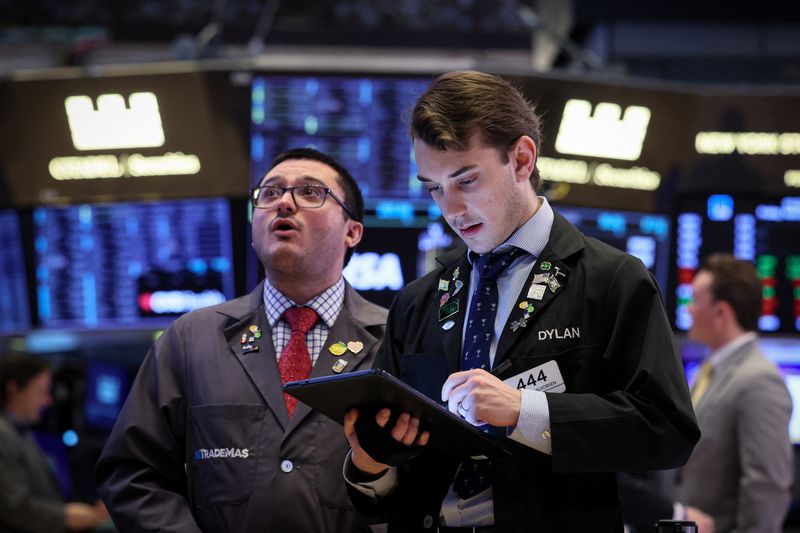
Investing.com -- It’s set to be a busy week in in markets with Friday’s U.S. jobs report, testimony by Federal Reserve Chairman Jerome Powell and a European Central Bank policy meeting the main highligts. Here’s what you need to know to start your week.
1. Nonfarm payrolls
Friday’s monthly jobs report will be keenly awaited with investors trying to gauge the timing of the first interest rate cut by the Federal Reserve, with bets currently targeting June amid hopes that the central bank can engineer a soft landing for the economy.
Signs of continued strength in the labor market could make it harder for investors to shrug off concerns about how a stronger-than-expected economy could reignite inflation if the Fed begins easing too soon.
Economists are expecting the economy to have added 190,000 jobs in February after January’s blowout 353,000 gain that was the largest in a year. The unemployment rate is expected to hold steady at 3.7%, while wage growth is expected to have moderated.
2. Powell testimony
Ahead of Friday’s jobs data, investors will get a chance to hear from Fed Chair Jerome Powell in his semiannual testimony on monetary policy before a House committee on Wednesday and a Senate panel on Thursday.
Powell is expected to reiterate that policymakers will stick to a cautious approach in deciding when to begin lowering interest rates given recent data pointing to strength in the economy and persistent price pressures.
Richmond Fed President Thomas Barkin said Friday it is too soon to predict when the central bank will be able to begin to cut its benchmark interest rate, as price pressures still exist in the U.S. economy.
3. Stock market rally
The Dow, the S&P 500 and the Nasdaq notched their fourth straight month of gains in February in a rally largely fueled by growth prospects related to AI, which has also lifted semiconductor names.
The S&P 500 and Nasdaq closed at record highs on Friday and the gains marked the second straight closing record for the Nasdaq, which also set an intraday record, surpassing its prior peak of 16,212.23 set in November 2021.
Markets have also been supported by indications that the economy remains resilient in the face of elevated interest rates.
"Because the economy is doing well and because inflation remains a bit sticky, the Fed will be slower to lower interest rates," Sam Stovall, chief investment strategist at CFRA Research in New York told Reuters.
"But that's good because then we're gradually coming off of the higher interest rate cycle and we're not in need of cutting rates aggressively."
4. ECB decision
The ECB is to meet on Thursday and no policy changes are expected, with investors instead waiting to see whether officials will repeat that it's too early to discuss rate cuts.
The ECB has pushed back on rate cut talk, with officials saying they need to see more evidence that inflation is on track to return to its 2% target, but markets are still expecting Frankfurt to begin cutting rates later this year with a first move expected in June.
Eurozone inflation data on Friday appeared to support the ECB’s cautious stance. Consumer price inflation slowed less than expected in February, while underlying inflation also moderated at a slower than expected pace.
The ECB's big worry is that wage inflation is still too high and risks stoking price pressures for longer.
5. Oil prices
Oil prices rose on Friday and posted weekly gains as traders awaited an OPEC+ decision on supply agreements for the second quarter while also weighing fresh U.S., European and Chinese economic data.
For the week, Brent added around 2.4% following the switch in contract months, while Crude Oil WTI Futures gained more than 4.5%.
A decision by the Organization of the Petroleum Exporting Countries on extending output cuts is expected during the coming week, according to reports, with individual countries expected to announce their decisions.
"The expectation that OPEC+ is going to continue with their voluntary production cuts well into the second quarter of 2024 is the main focus on the market," Andrew Lipow, president of Lipow Oil Associates told Reuters.
Geopolitical tensions in the Red Sea also look set to continue to underpin prices.
--Reuters contributed to this report

By Tom Westbrook
SINGAPORE (Reuters) -The dollar tracked toward monthly gains on Thursday ahead of highly-anticipated inflation data that could ruffle the interest rate outlook, while the sliding yen found a footing after a policymaker hinted at the need to exit ultra-easy policies.
Bitcoin was on the charge, topping $63,000 early in the European morning for a gain of nearly 50% in February. The monthly rise is the largest since December 2020, and a record high above $69,000 is within sight. It was last at $63,051.
The yen and fellow safe-haven Swiss franc are the worst performing G10 currencies against the dollar this month as investors have sought out riskier assets and as bets on U.S. interest rate cuts have been dialled back - lifting the dollar.
The yen last traded at 149.87 to the dollar, down about 2% on the month. It was almost 0.6% higher on the day after Bank of Japan board member Hajime Takata said he felt there were finally prospects for achieving the bank's 2% inflation target, paving the way to leave behind negative rates and yield caps.
The yen is down more than 2% on the euro this month and made nine-year lows on the Australian and New Zealand dollars as investors pick up income by borrowing yen at rates near zero and selling it against currencies where interest rates are higher.
"Takata's remarks should add to conviction that an earlier than expected hike at March meeting should not be ruled out," said Christopher Wong, currency strategist at OCBC.
"With JPY shorts at record high, unwinding of shorts should see JPY bears run for cover."
The euro was steady at $1.0835 and largely flat for the month, as was sterling at $1.2665. The Australian and New Zealand dollars have lost ground in February as expectations firmed that rate hikes have finished down under.
The New Zealand dollar in particular nursed losses at $0.6105, having dropped 1.2% on the dollar a day ago when the central bank held rates and surprised markets with a downward tweak to its rates forecast. The Australian dollar ticked 0.3% higher to $0.6516 on Thursday for a monthly drop of 0.8%.
The Federal Reserve's favoured measure of inflation - the core personal consumption expenditures (PCE) price index - is due later on Thursday and forecasts are for a rise of 0.4%.
It was not long ago investors were hoping for just a 0.2% increase but high readings on consumer and producer prices suggest the risk is for a result as high as 0.5%.
"A stronger than expected PCE deflator can cause markets to reduce pricing for a May rate cut even further, supporting U.S. dollar," said Commonwealth Bank of Australia (OTC:CMWAY) currency strategist Kristina Clifton.
Markets price about a 20% chance of a Fed easing in May, and have pushed out the likely timing of a cut to June. Futures imply a little more than three 25 basis point cuts this year, compared to five at the start of the month.
The U.S. dollar index was little changed at 103.86.
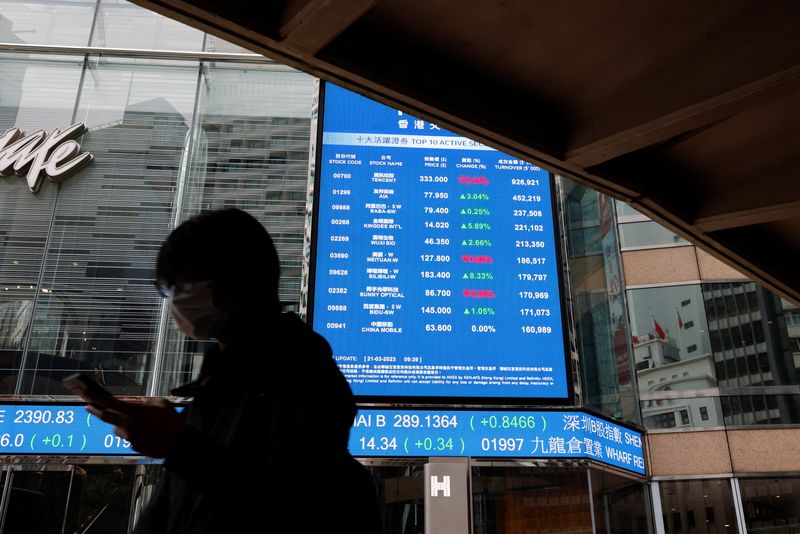
By Summer Zhen
HONG KONG (Reuters) - Only 62 new hedge funds launched in Asia last year, the lowest since number since 2009 and just 15 were China-focused funds, data provider Preqin said.
But Japan-focused funds more than doubled to 19.
WHY IT'S IMPORTANT
The figures underscore the shift away from China as the world's second-largest economy struggles amid a property sector crisis and trade tensions with the United States.
Instead there is rising demand for Japan, pan-Asia, and multi-manager strategies, market participants say.
BY THE NUMBERS
* Liquidations outpaced launches in 2023 with 74 funds closing shop and nearly half of those were China-focused funds, the data showed.
* Only 15 hedge funds with a focus on China were launched, plummeting from 34 in 2022 and marking the lowest number since 2004.
WHAT’S NEXT
At least three multi-manager hedge funds which invest in a variety of asset classes are in the pipeline for this year, according to market participants and allocators.
One of those will be launched by Arrowpoint Investment Partners, run by Jonathan Xiong, former Asia co-CEO at Millennium Management. Bloomberg first reported the fund launch.
The firm has raised about $1 billion from investors, according to sources familiar with the matter who were not authorised to speak to media and declined to be identified.
Xiong declined to comment.
QUOTES
Patrick Ghali, managing partner of Sussex Partners, remains cautious about the potential for much growth in new fund launches this year.
"Japan is of great interest at the moment, but a lot of investors don't fully understand the incredible alpha opportunity of that market and are investing in long only funds instead," he said, referring to the potential to generate returns that are higher than market benchmark gains.
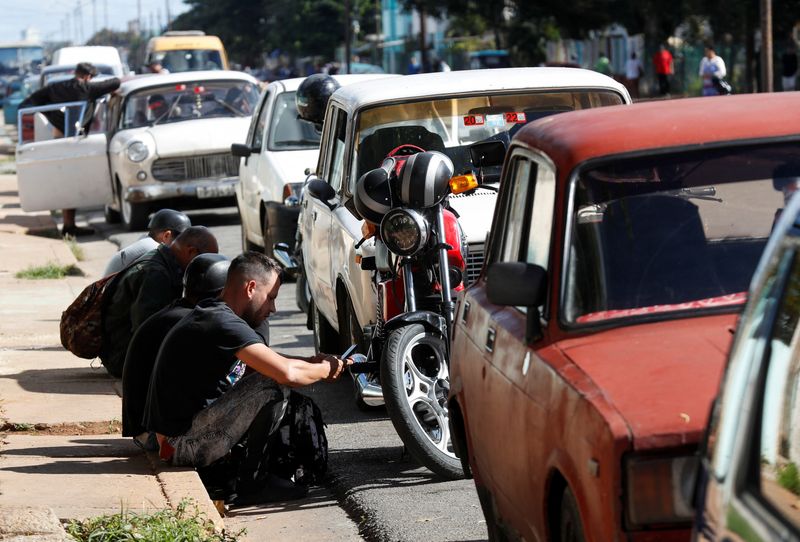
By Dave Sherwood
HAVANA (Reuters) -Cuba`s government said it plans to reschedule an unpopular five-fold increase in retail gasoline prices for March 1, a month later than initially planned, after officials said its systems had suffered a cyberattack.
The problems caused by the late January cyberattack have been resolved, economy vice minister Mildred Granadillo said in a state-run media report, allowing the government to move forward with retail price increases at the pump.
Cuba in late December announced a series of measures, including hikes in fuel and public transport prices, in a bid to narrow a ballooning fiscal deficit. Critics have attacked the policies as inflationary, ill-timed and lacking incentives for domestic production.
"The measure in itself has an inflationary impact; however, there is a group of decisions that mitigate its impact,” said minister of finance and prices Vladimir Regueiro.
Officials said they had decided to limit the fuel price rises on March 1 to the retail sector, leaving the discounted wholesale prices that apply to public services such as transportation unchanged to soften the blow on consumers.
The communist-run government said it would also move forward on March 1 with a previously announced hike in the price of electricity for top-tier users, but decided to hold off on increasing the price of liquefied gas used widely on the island for cooking.
The price increases come as Cuba undergoes its worst economic crisis in decades, prompting a record-breaking migration off the island and growing angst among Cubans who suffer severe shortages of food, fuel and medicine.
Blackouts, too, have been on the rise in recent weeks, with deficits in generation at times running at nearly one-third of demand, leaving many in the dark for several hours a day.
Energy and mines minister Vicente La O Levy said the retail fuel price hikes - which include selling some gasoline in dollars - would more closely reflect its market value and help Cuba purchase more fuel to stem the blackouts and shortages.

By Hyonhee Shin
SEOUL (Reuters) - North Korean leader Kim Jong Un has called for an "industry revolution" in rural regions by building factories nationwide, state media KCNA said on Thursday, amid chronic food shortages and widening economic inequality.
Attending the groundbreaking ceremony for a plant in Songchon County, east of the capital Pyongyang, Kim pledged to push ahead with his "Regional Development 20×10 Policy", under which the country seeks to open modernised factories in at least 20 remote counties every year for the next 10 years.
The policy was unveiled as Kim's key economic initiative at a meeting last month of the Supreme People's Assembly, the country's rubber-stamp parliament.
"Establishing regional industry factories equipped with modern equipment and production lines in every city and county of the country within the next 10 years is truly a great revolution with enormous epochal significance," Kim told the ceremony, according to KCNA.
Kim handed over regimental colours at the ceremony to a military unit that has recently been created to carry out the initiative, saying that they would "create an era of great change for radically developing regions".
Kim has been pushing for modernising the farming sector and rural communities as North Korea's economy heavily relies on agriculture but has long grappled with food shortages amid sanctions over its weapons programmes and seasonal impacts from natural disasters.
North Korean defectors have reported deepening inequality between largely elite residents of Pyongyang and other major cities, and the farming population in rural areas.
South Korea's unification ministry said last month that the economic gap between them appears to have further widened in terms of everything from food rations and housing to education and access to healthcare.
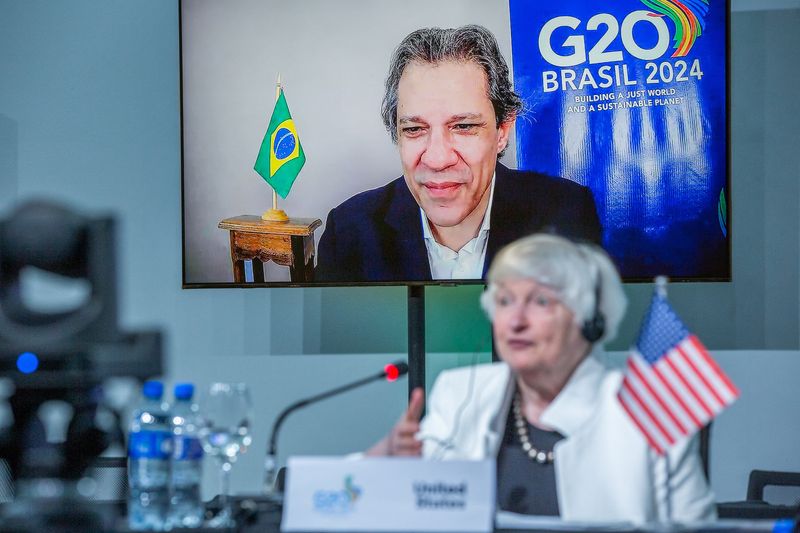
By Andrea Shalal, Christian Kraemer and Marcela Ayres
SAO PAULO (Reuters) - Western powers butted heads over how to handle frozen Russian assets on Wednesday as G20 finance ministers kicked off a discussion of challenges for the global economy, trying to set aside deep geopolitical divisions.
Brazilian officials hosting the two-day meeting in Sao Paulo sought to focus talks on economic cooperation to tackle issues such as climate change and poverty, proposing a joint statement that avoids direct mention of the wars in Ukraine and Gaza.
Yet the geopolitical issues hanging over the event soon spilled into the open, with even close allies divided over what to do with Russian assets blocked by Western powers.
Those fissures were visible after ministers from the Group of Seven (G7) major democracies gathered early on Wednesday before the G20 proceedings, debating whether the frozen assets could finance the reconstruction of Ukraine.
U.S. Treasury Secretary Janet Yellen on Tuesday said she believed there was a strong basis in international law to unlock value from the Russian assets, as collateral or by seizure.
But French Finance Minister Bruno Le Maire argued on Wednesday that there is not enough basis in international law to seize the Russian assets, emphasizing that such a move would require the endorsement of G20 members and other countries.
"We should not add any kind of division among the G20 countries," he told reporters. "If the legal basis is not sufficient ... you will create more divisions at a time when we need more unity to support Ukraine."
Their disagreement underscored tricky geopolitical terrain for the G20 group of major world economies, whose foreign ministers last week in Rio de Janeiro vented deep divisions over the war in Ukraine and Israel's bombardment of Gaza.
Brazil's coordinator of the G20 finance track in Sao Paulo, Tatiana Rosito, said negotiations for the economic portion of the group's communique were successfully completed by deputy ministers in a "very positive" atmosphere.
A draft version of the communique, seen by Reuters on Tuesday, made only a passing reference to regional conflicts.
But German Finance Minister Christian Lindner said his country will only agree on the G20 communique if geopolitical issues such as the war in Ukraine are mentioned.
Brazil is trying with its presidency of the G20 to shift discussions away from geopolitical tensions between major powers and toward a consensus on sustainable development, while trying to give developing nations of the Global South more voice.
In his address opening the meeting of finance ministers and central bank governors, Brazilian Finance Minister Fernando Haddad proposed a global minimum wealth tax, representing a potential new pillar for international tax cooperation.
Haddad had already suggested the G20 tackle tax havens for the most wealthy and inheritance taxes favoring the super-rich.
Brazil's central bank governor Roberto Campos Neto called the fight against inflation a crucial tool for combating inequalities, one of Brazil's priorities in the G20 presidency.
While acknowledging recent progress in disinflation since the pandemic, Campos Neto called for persistence.
"There is still work to be done in the last mile, and risks remain ahead," he said.

